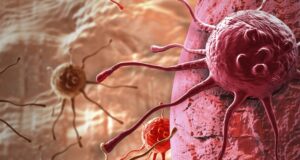
Announcing a new publication for Acta Materia Medica journal. Fatty acid (FA) reprogramming has a significant role in liver cancer. However, the contribution of FA metabolism reprogramming to the heterogeneity of hepatocellular carcinoma (HCC) has not been established. This article describes how bioinformatics analysis using single-cell sequencing, a non-negative matrix factorization (NMF) algorithm, and survival analyses were used to investigate FA metabolism reprogramming in HCC patients. Molecular targets and the progress of drug discovery were also analyzed and discussed.
Among 13 types of HCC cells, epithelial cells exhibited the highest score for FA metabolic aberrance, while certain lymphocytes, such as B cells, CD8Tcm cells, and Treg cells, exhibited the lowest score. Furthermore, epithelial cells displayed significant diversity in FA metabolism with a wide distribution range (−0.2 to 0.8). Additionally, a low level of FA metabolism was associated with poor prognosis in HCC patients (log-rank test, P=0.0089). Higher oxidase expression was correlated with a lower risk of oncogenesis and higher overall survival. However, enzymes involved in synthesis, oxidation, storage, and release exhibited considerable phenotypic diversity in HCC.
FA metabolism reprograming was shown to be significantly correlated with the heterogeneity of HCC, which is characterized by a diversity of cancerous cells and enzymes.
Source:
Journal reference:
Guo, Y., et al. (2024). Bioinformatics-based analysis of fatty acid metabolic reprogramming in hepatocellular carcinoma: cellular heterogeneity, therapeutic targets, and drug discovery. Acta Materia Medica. doi.org/10.15212/amm-2024-0057.



